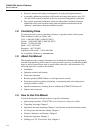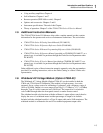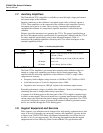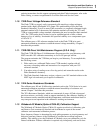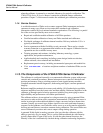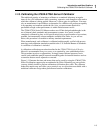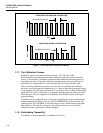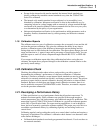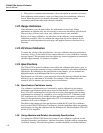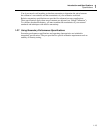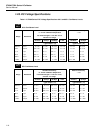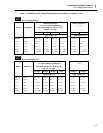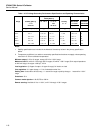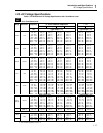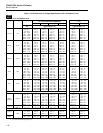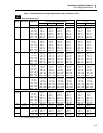
5700A/5720A Series II Calibrator
Service Manual
1-12
• The process is consistent and automatic: it does not require an operator’s assistance.
Each calibration check produces a new set of data points for accumulating a historical
record. When this process is externally automated, significant history can be
accumulated much faster than with a manual calibration.
1-22. Range Calibration
After calibration, you can make further fine adjustments to each range. Range
adjustments are optional; they are not necessary to meet total uncertainty specifications.
However, they do allow you to align your calibrator closer to your standards.
Before you do range calibration, you must first use the calibrator’s semi-automated
calibration procedure. This is to calibrate the ranges that will not be adjusted. It also
performs an initial adjustment for each range, and supplies flatness corrections for ac
functions.
1-23. DC Zeros Calibration
To ensure the validity of the specifications, a dc zeros calibration must be performed at
least every 30 days. If more than 30 days elapse without a dc zeros calibraiton a warning
message appears. This procedure does not require any external equipment or connections
and takes approximately 2.5 minutes to complete.
1-24. Specifications
The 5700A/5720A Series II calibrators are verified and calibrated at the factory prior to
shipment to ensure they meet the accuracy standards required for all certified calibration
laboratories. By calibrating to the specifications in this chapter, you can maintain the
high performance level throughout the life of your calibrator.
Specifications are valid after a warm-up period of twice the time the calibrator has been
turned off, up to a maximum of 30 minutes. For example, if the calibrator has been
turned off for five minutes, the warm-up period is ten minutes.
1-25. Specification Confidence Levels
You calibrator’s performance level is ensured by regular calibration to the primary
performance specifications, which are provided at both the 99% and 95% confidence
levels. The 95% confidence level will provide an accuracy that surpasses the accuracy
requirements for meeting Tag 4 standards, or a coverage factor of 2. Calibration at the
99% confidence level is also available for those applications that require a confidence
factor for the specifications that is higher than 95%. For information on selecting the
confidence level, refer to Chapter 4.
The tables in this chapter provide specifications at both the 95% and 99% confidence
levels for the 5700A/5720A Series II calibrators. Included with these tables are operating
specifications for using the calibrator with the Wideband AC Module (Option 5700A-03)
and the 5725A Amplifier.
1-26. Using Absolute and Relative Uncertainty Specifications
To evaluate the 5700A/5720A Series II coverage of your calibration workload, use the
Absolute Uncertainty specifications. Absolute uncertainty includes stability, temperature
coefficient, linearity, line and load regulation, and the traceability to external standards.



